Challenge 4:Statistical Data to Promote Quality Education
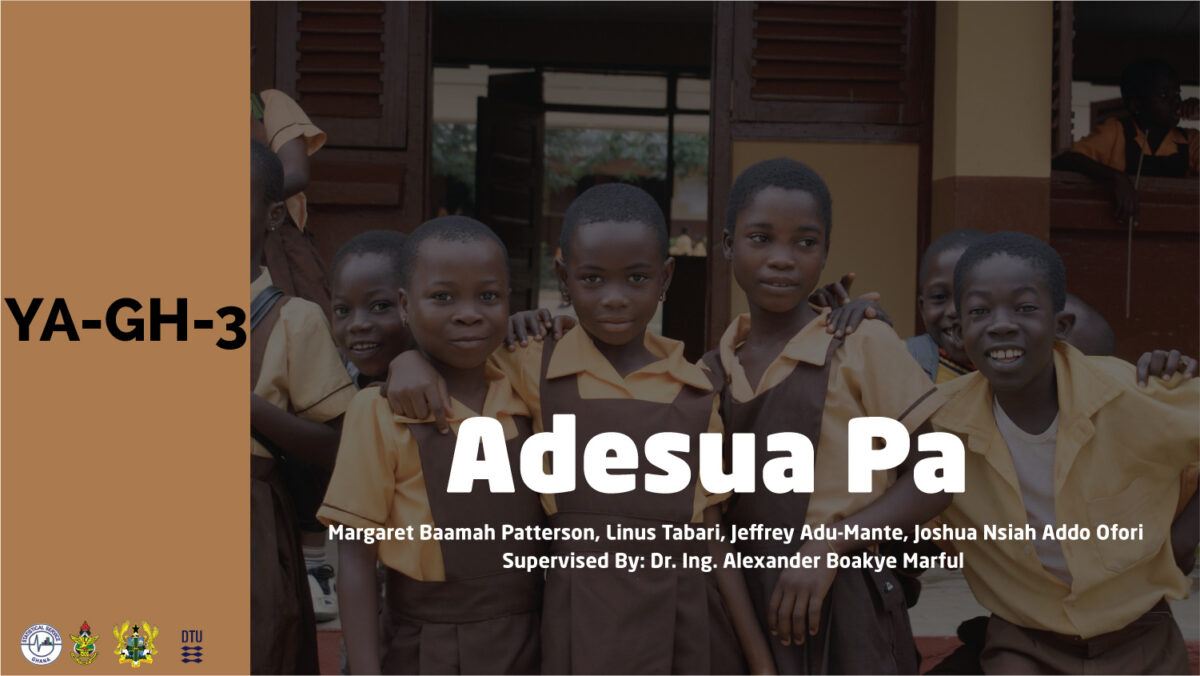
Top Level Key Words:
Educational outcomes, quality education, AI in education, educational disparities, data driven decisions
The Ghana Statistical Service (GSS) stands at the forefront of gathering, analyzing, and sharing vital statistics that shape the nation’s policies and plans. Through its comprehensive censuses and surveys, GSS delivers critical data that drives the development agenda of Ghana and tracks the progress of global initiatives like the Sustainable Development Goals (SDGs) and the African Union’s Agenda 2063 (GPSDD, 2024).

Specifically, SDG Goal 4 aims to provide inclusive, high-quality education and promote lifelong learning for all. This goal emphasizes nurturing every aspect of a child’s development—social, emotional, mental, physical, and cognitive—regardless of their background or location (UNICEF, 2015). However, GSS data reveals a stark reality: a significant gap in education quality persists in Ghana, with families in impoverished, rural areas facing greater challenges in accessing quality education, leading to lower levels of educational achievement in these regions (GSS, 2021).
GETTING A HANDLE ON THE CHALLENGE
The challenge lies in addressing the interconnected issues of educational disparities and the lack of access to quality education, particularly for underserved communities. The root of the problem is that both parents and policymakers lack the necessary tools, skills, data and technical know-how to make informed decisions that could close the gap between different regions and socioeconomic groups.
By leveraging emerging technologies like AI and making educational data more accessible and understandable to households, it becomes possible to provide personalized, data-driven insights that empower parents to choose the best educational options for their children. This approach also enables policymakers to allocate resources more effectively, ensuring that investments are made where they are most needed to improve educational outcomes.
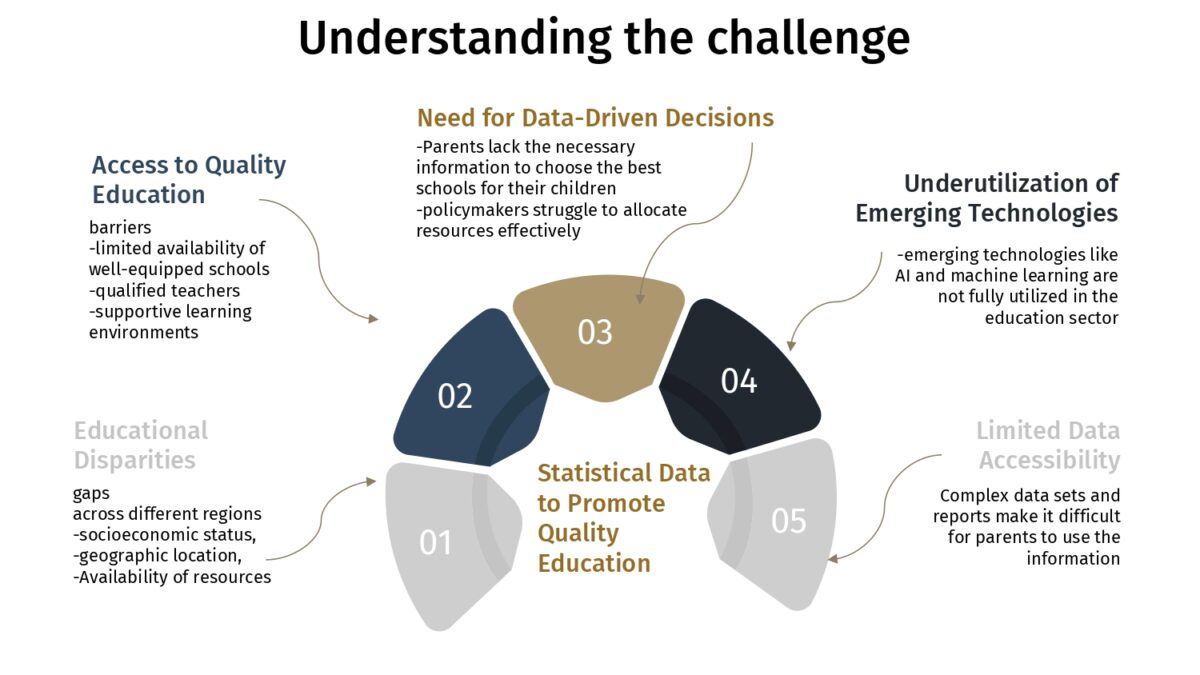
The Actual Problem
There are major gaps in access to quality education in Ghana, and parents don’t have the data they need to make informed choices about their children’s education.
Anticipated Outcome
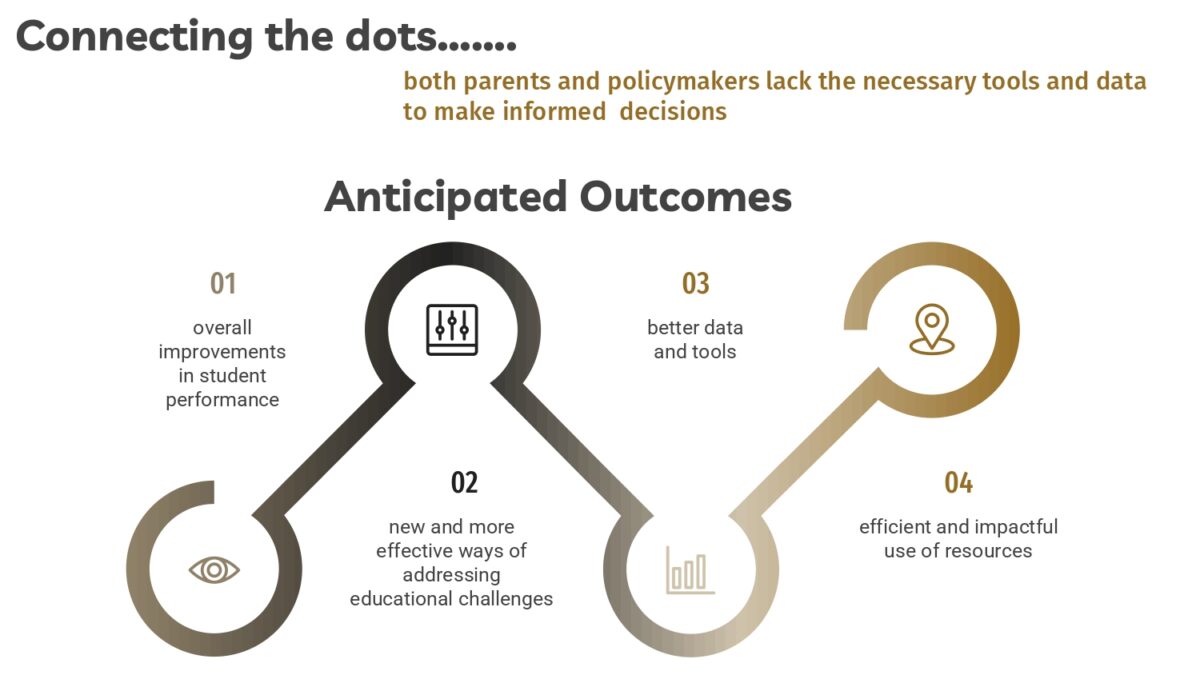
Pathway to the solution
Methodology
To tackle the pressing issue of educational disparities and empower parents with better decision-making tools, we implemented a robust and multi-faceted methodology. This approach seamlessly blends in-depth data analysis, cutting-edge technology integration, and meaningful stakeholder engagement. By combining these elements, we aimed not only to identify and address the gaps in access to quality education but also to create a user-friendly platform that truly meets the needs of parents, educators, and policymakers alike. Our methodology was designed to be both comprehensive and adaptive, ensuring that the solutions we develop are effective, equitable, and sustainable in the long term.
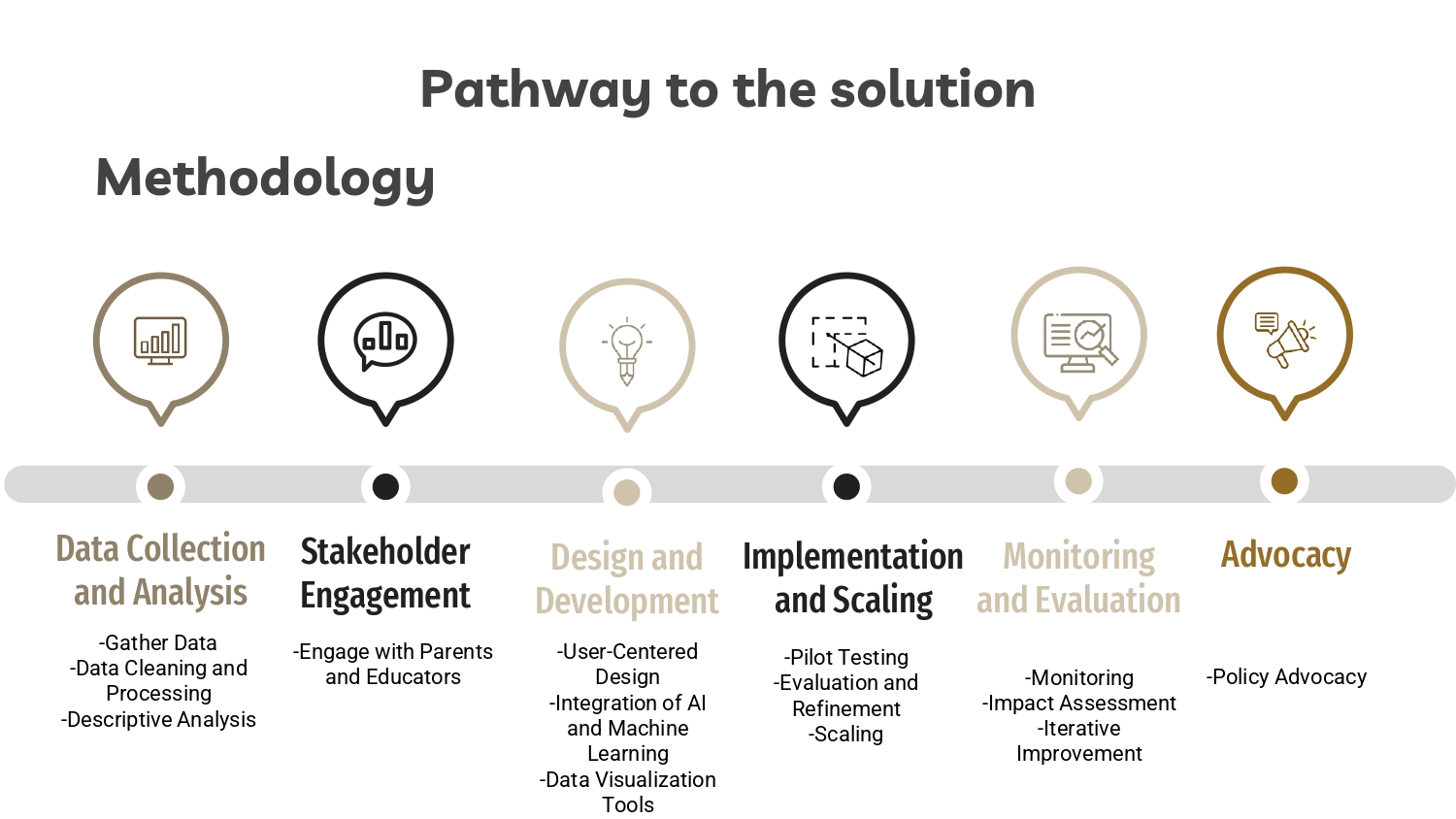
Our Solution
Why a Web App?
Due to limitations in internet bandwidth and users’ storage capacity, we have decided to shift our focus from developing a mobile app to creating a web-based application and also a USSD to allow query of information without internet connection.
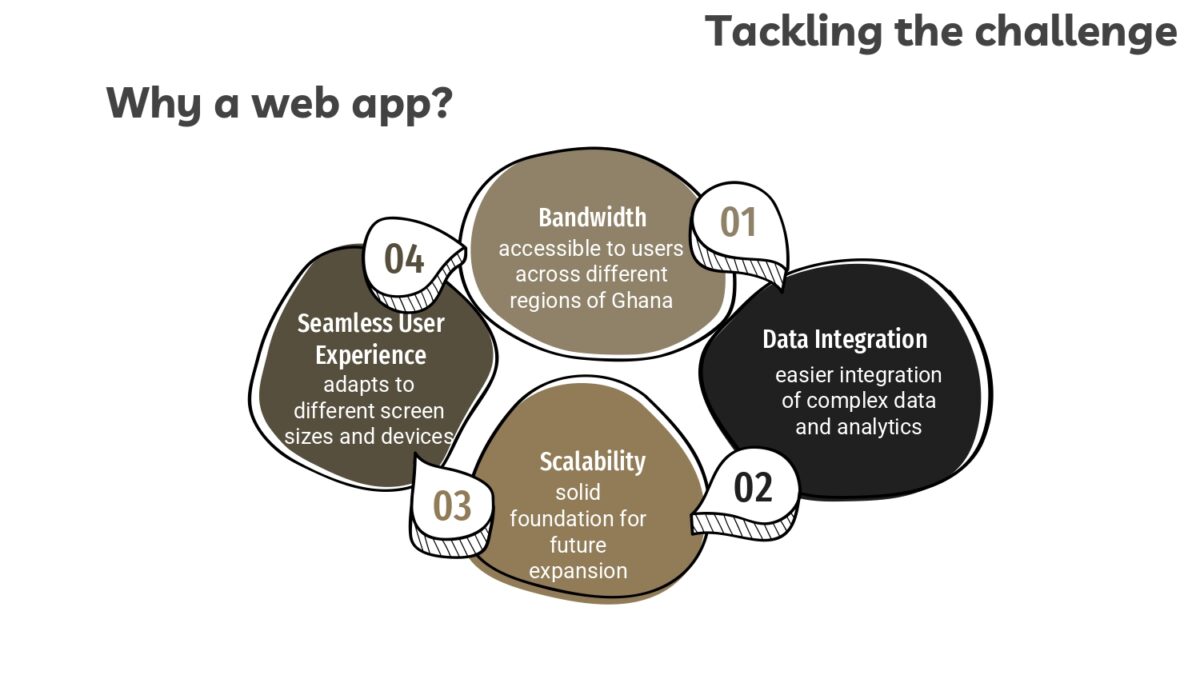
Design Concept
Inspired by the Adinkra symbol “Nea Onnim,” which means “He who does not know can know through learning,” the Smart School Finder platform is designed to guide users on a journey of discovery and informed decision-making. The platform’s purpose is to empower parents and guardians to find the best educational opportunities for their children, particularly in regions where access to quality education is limited. This concept centers around simplicity, inclusivity, and the transformative power of learning, embodying the spirit of “Nea Onnim.”
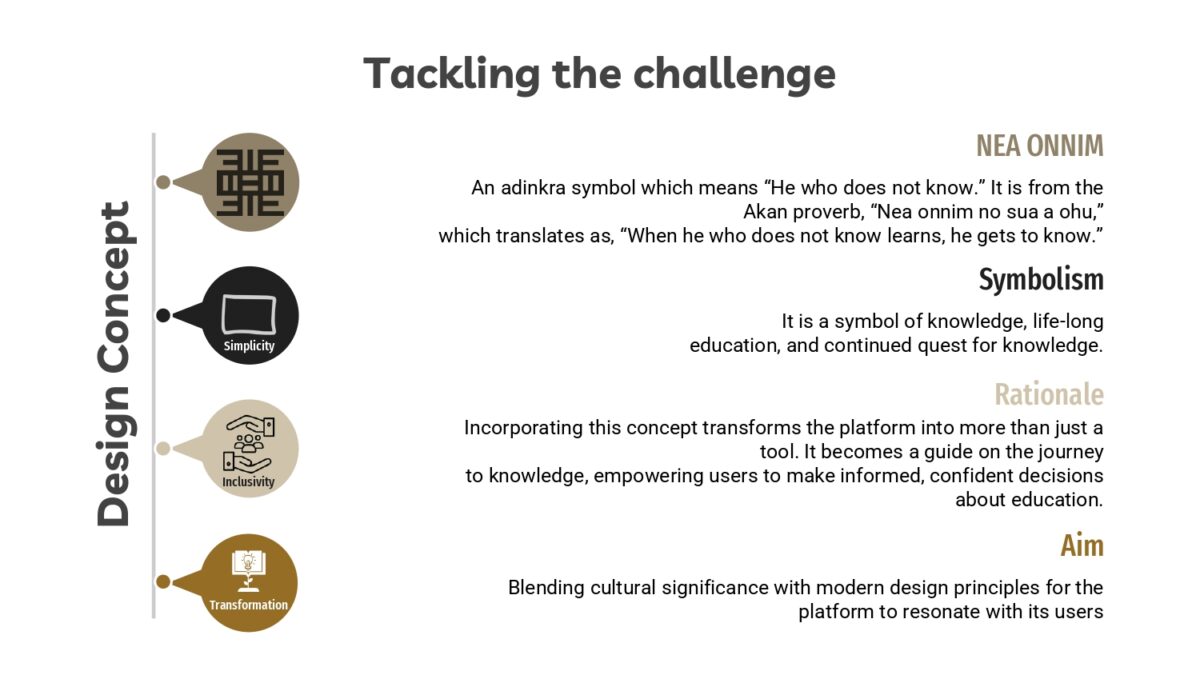
Name of website – “Adesua pa”
Rationale
“Adesua Pa” means “Good Education” in Akan, directly reflecting the platform’s goal of helping users find the best educational opportunities for their children. This name is simple, memorable, and culturally resonant, emphasizing the importance of quality learning and making informed decisions.
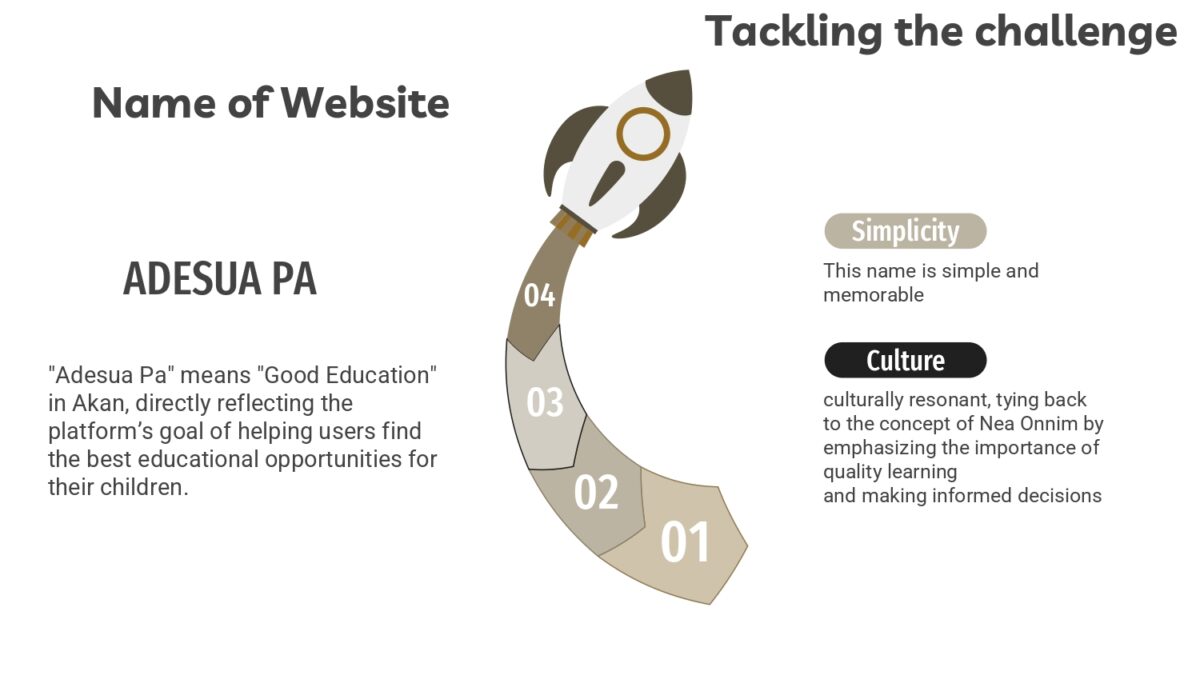
Design Objectives
The design objectives for Adesuapa are centered on tackling the key challenges highlighted in the problem outline, with a strong emphasis on creating a platform that is not only intuitive and easy to use but also powerful in driving real, transformative change.
Who is going to use the system?
- Parents
- Educational Institutions
- Governmental Institutions
How would they use the system?
Parents –To search and access detailed information about various schools
Location (Address, Region), Curriculum, Extra curricular activities, number of students, and teachers, Utilities,
Transportation, Virtual tours, Achievements, Contact details (Phone, Email, Website), Gender distribution,
Religious affiliations, Facilities and Resources, Financial Information.
Educational Institutions – To submit and manage their school’s data and performance metrics
Location (Address, Region), Contact details (Phone, Email, Website), Curriculum, Student-teacher ratio,
Student enrollment numbers, Teacher qualifications and experience, Academic achievements (Exam results,
awards), Facilities and Resources, Financial Information, Gender distribution, Religious affiliation options,
Safety and Security.
Governmental Institutions – To retrieve and analyze data from schools for policy and planning purposes
Educational Performance, Access to Education, Resource Allocation, Equity in Education, Infrastructure and
Logistics, Financial Overview, Health and Safety
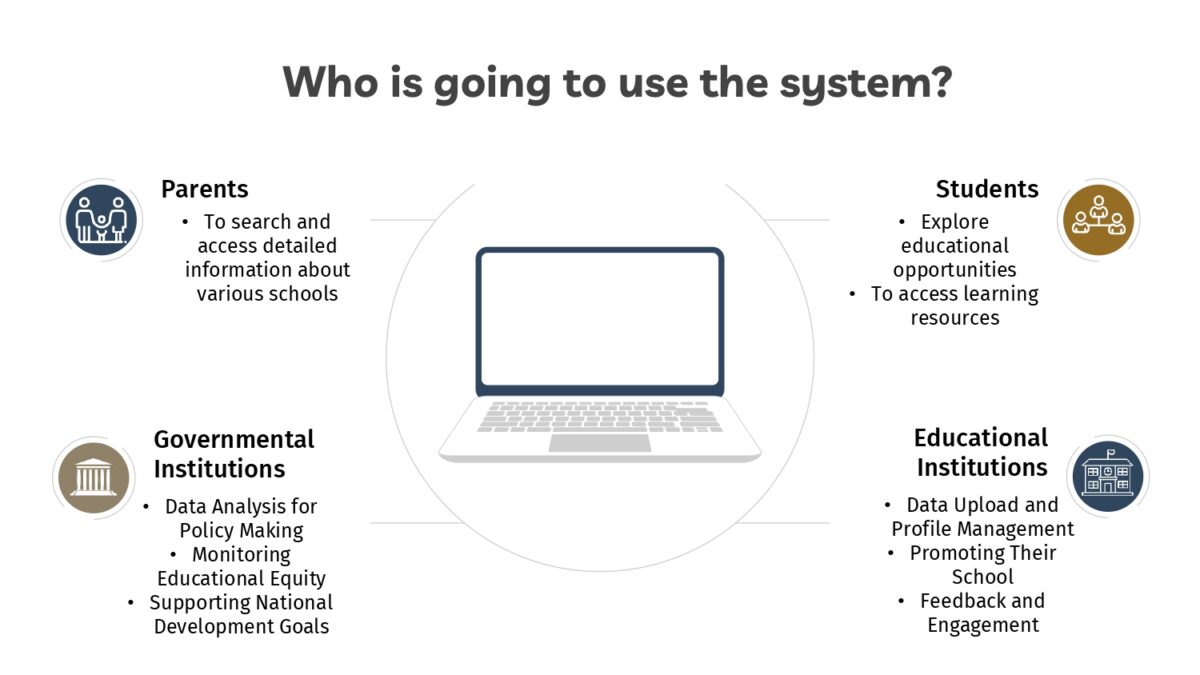
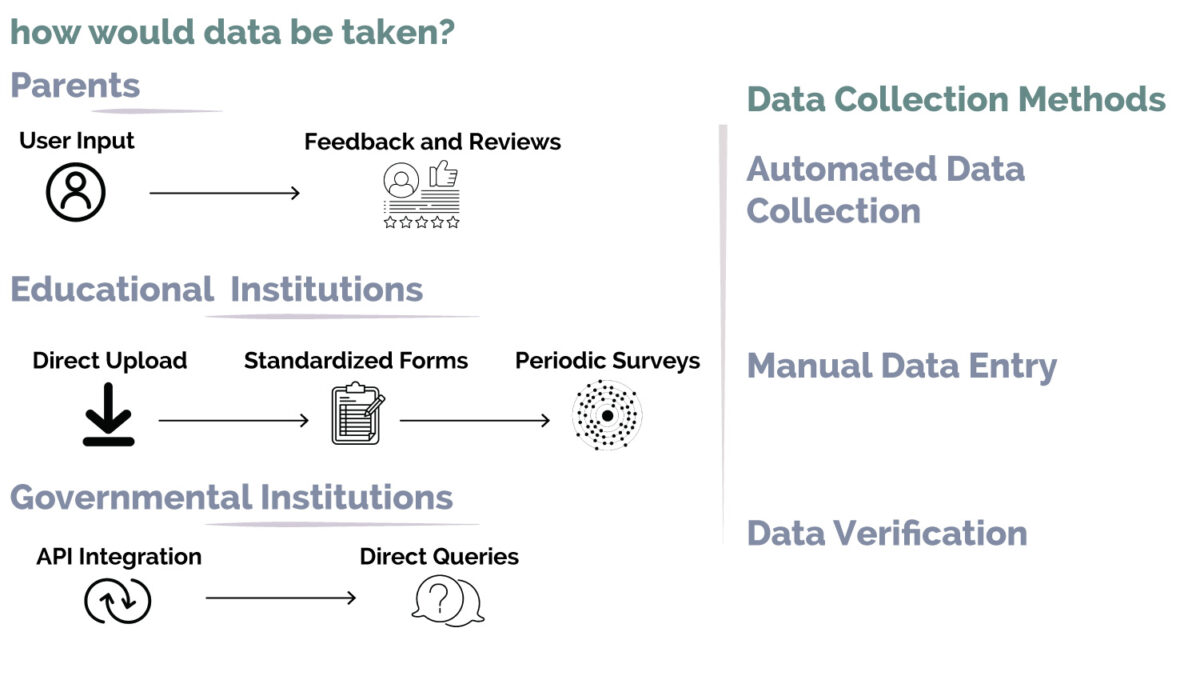
ADRESSING THE CHALLENGE
The Outcome
Introducing the Adesua PA School Finder
Information at a click
The Adesua Pa School finder is a comprehensible, user friendly, mobile responsive and inclusive web app.
Our new and mobile responsive web app helps families find the right schools for their children. It’s a one-stop solution for:
- Searching schools by location, type, and accessibility
- Viewing detailed school profiles, including facilities and reviews
- An Interactive chatbot availiable in the 5 local langage (Akan, Ewe, Dagbani, Ga, Hausa)
- Using interactive maps to visualize school locations
- Getting real-time updates on school listings and events
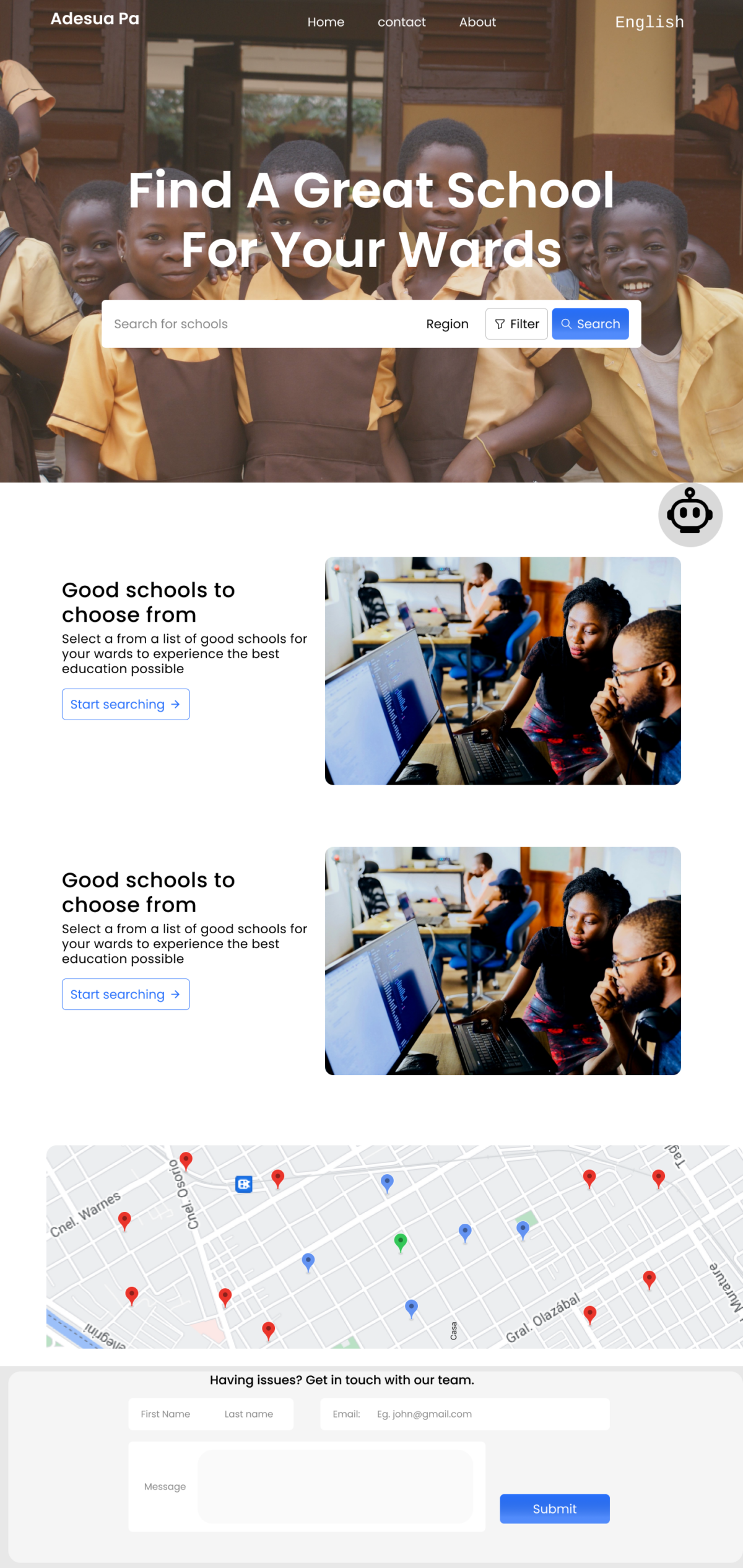
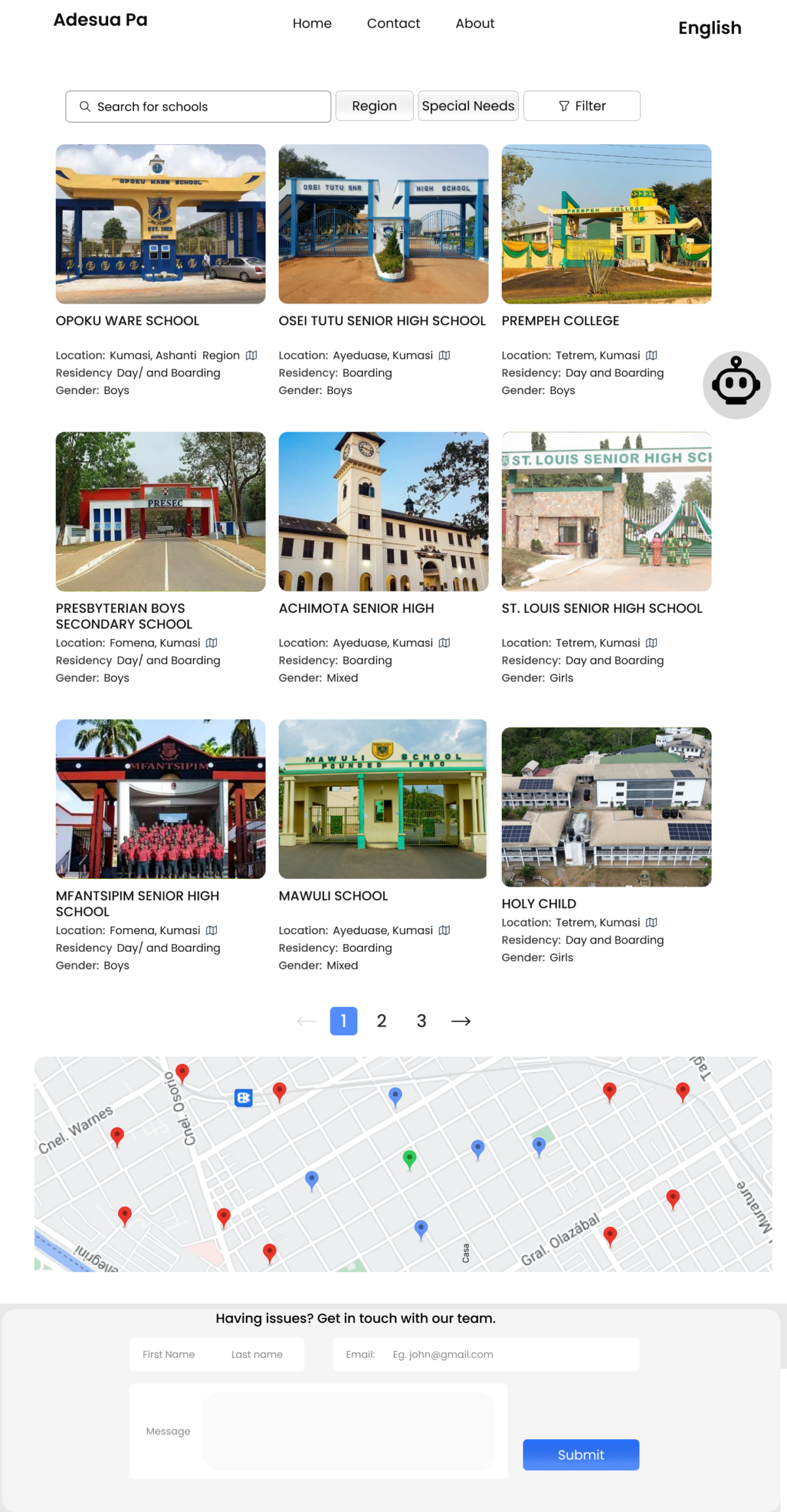
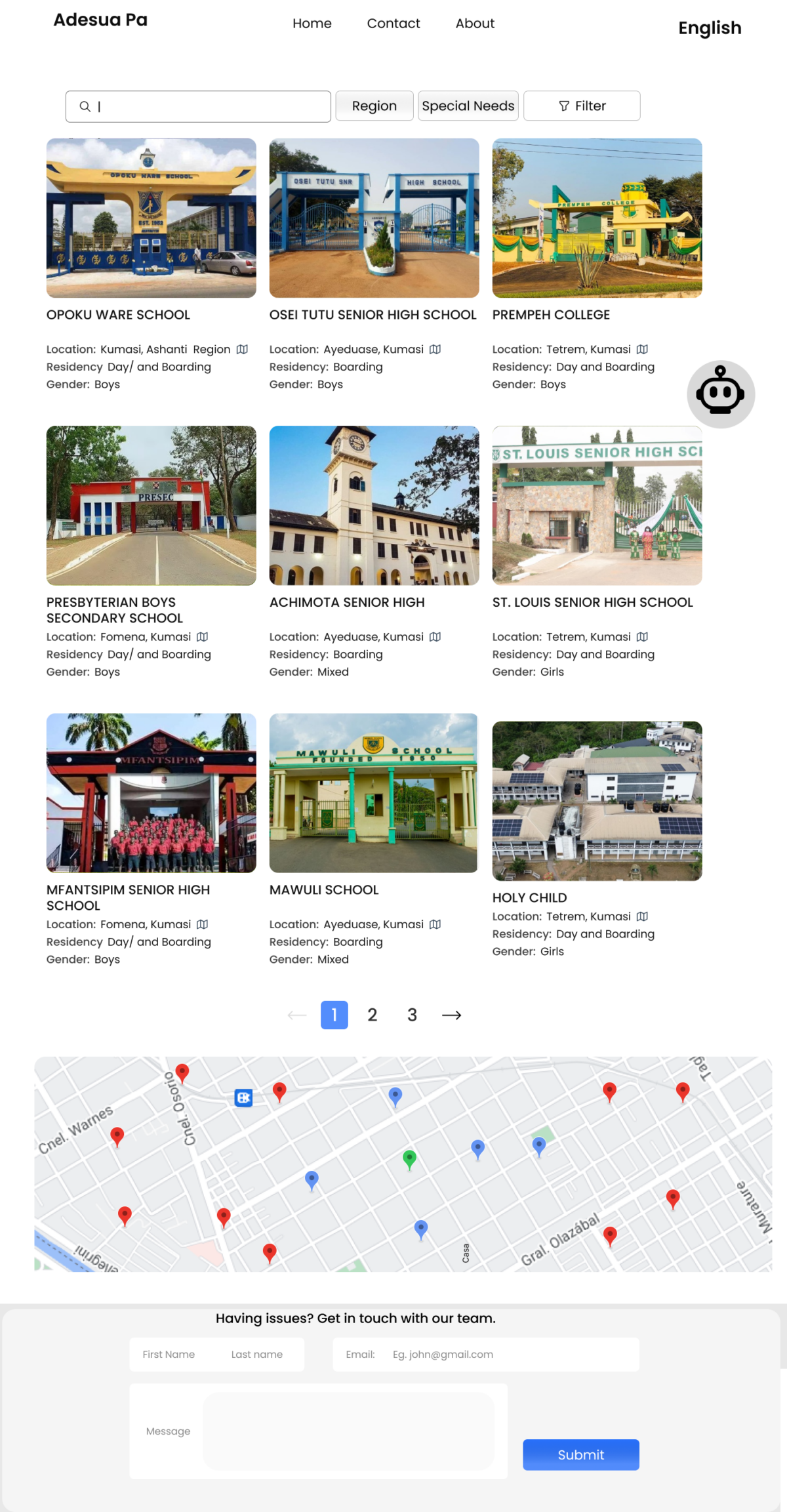
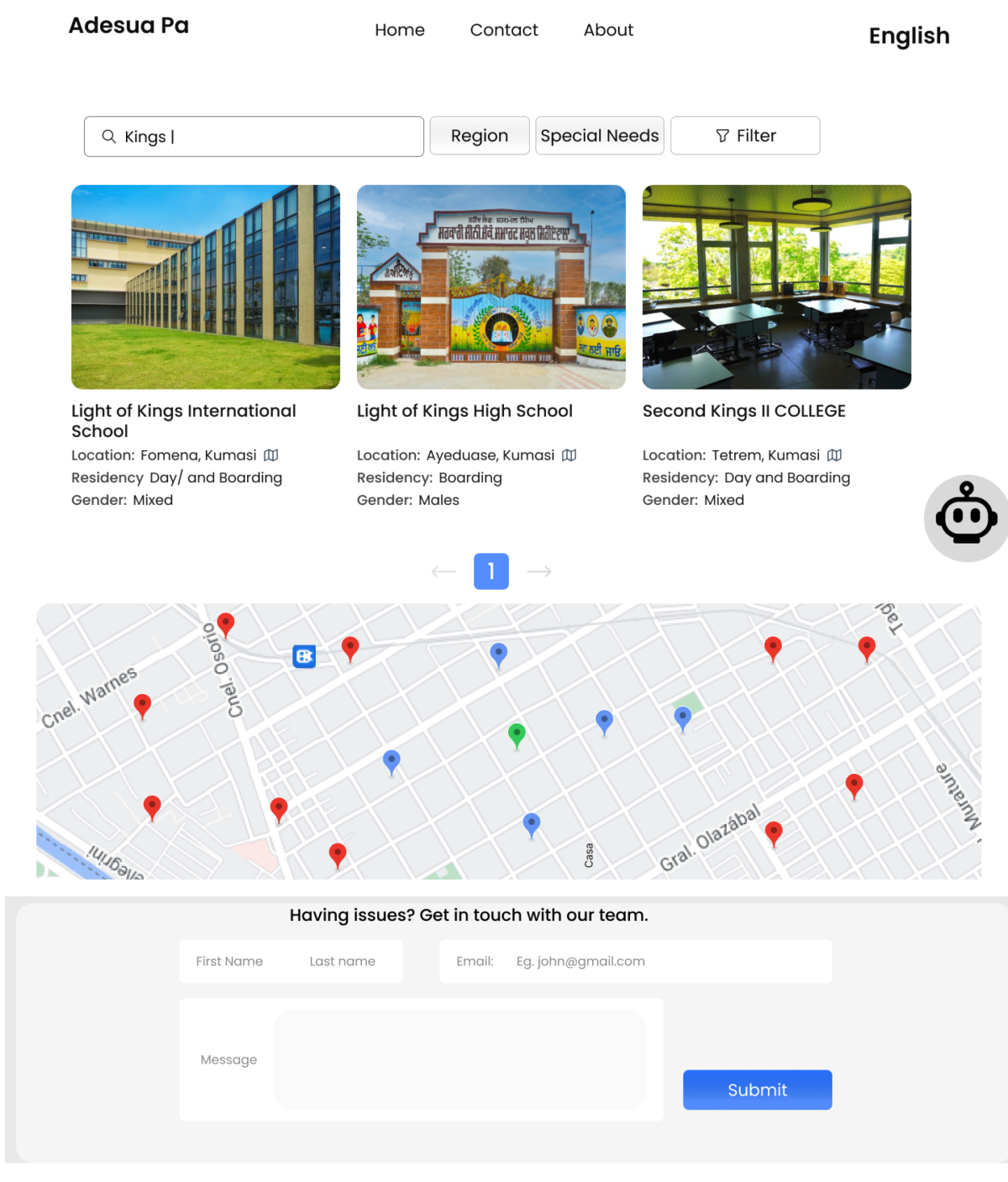
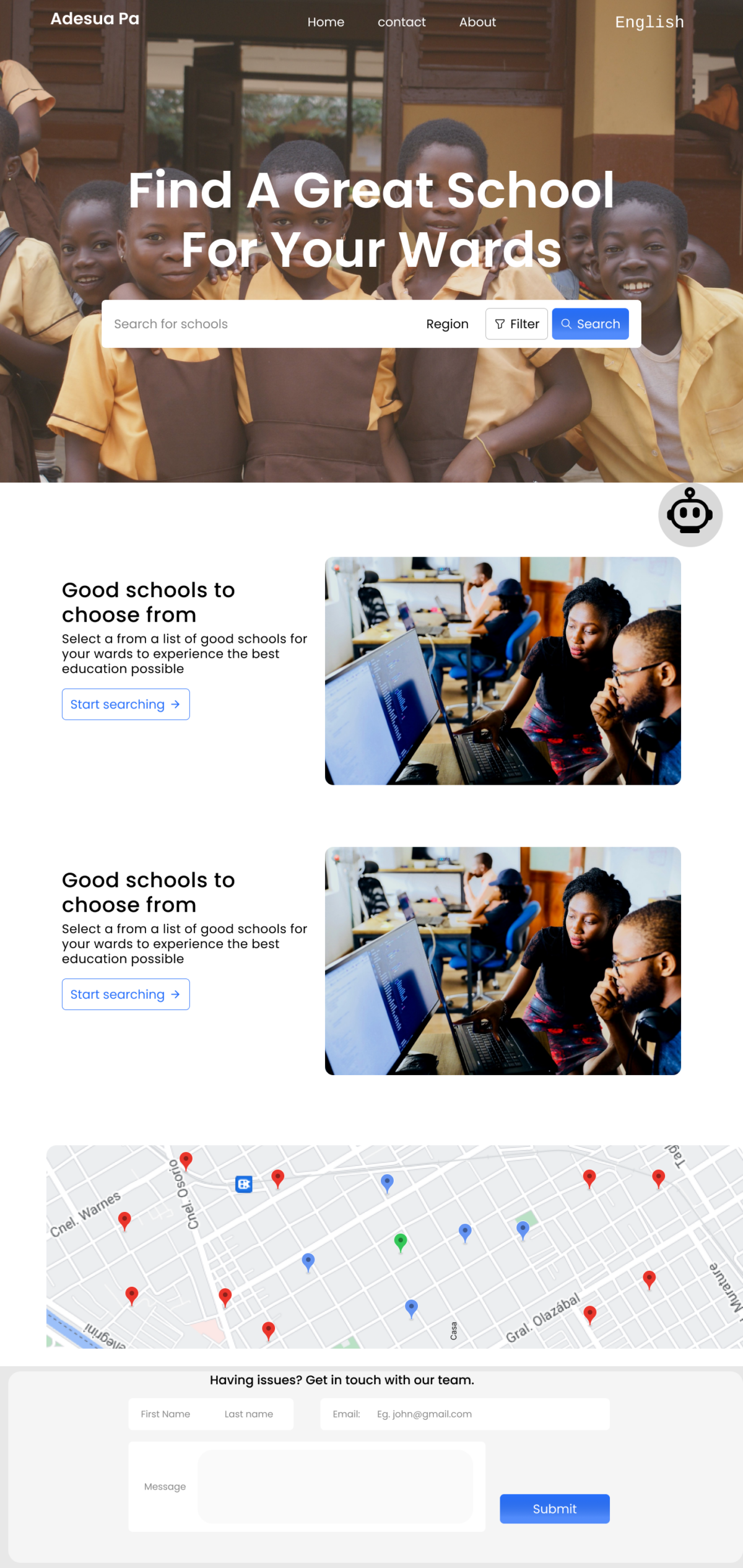
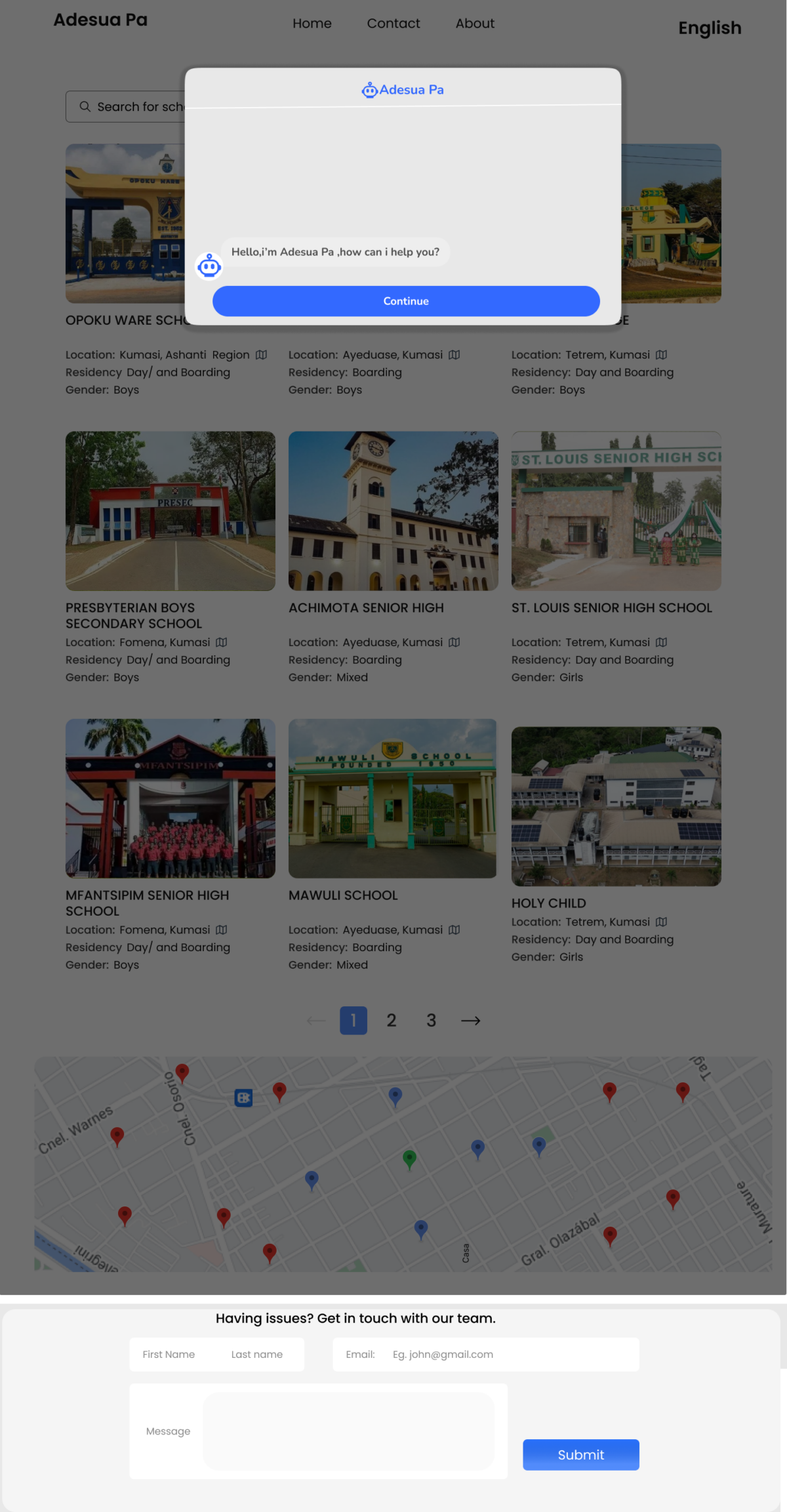
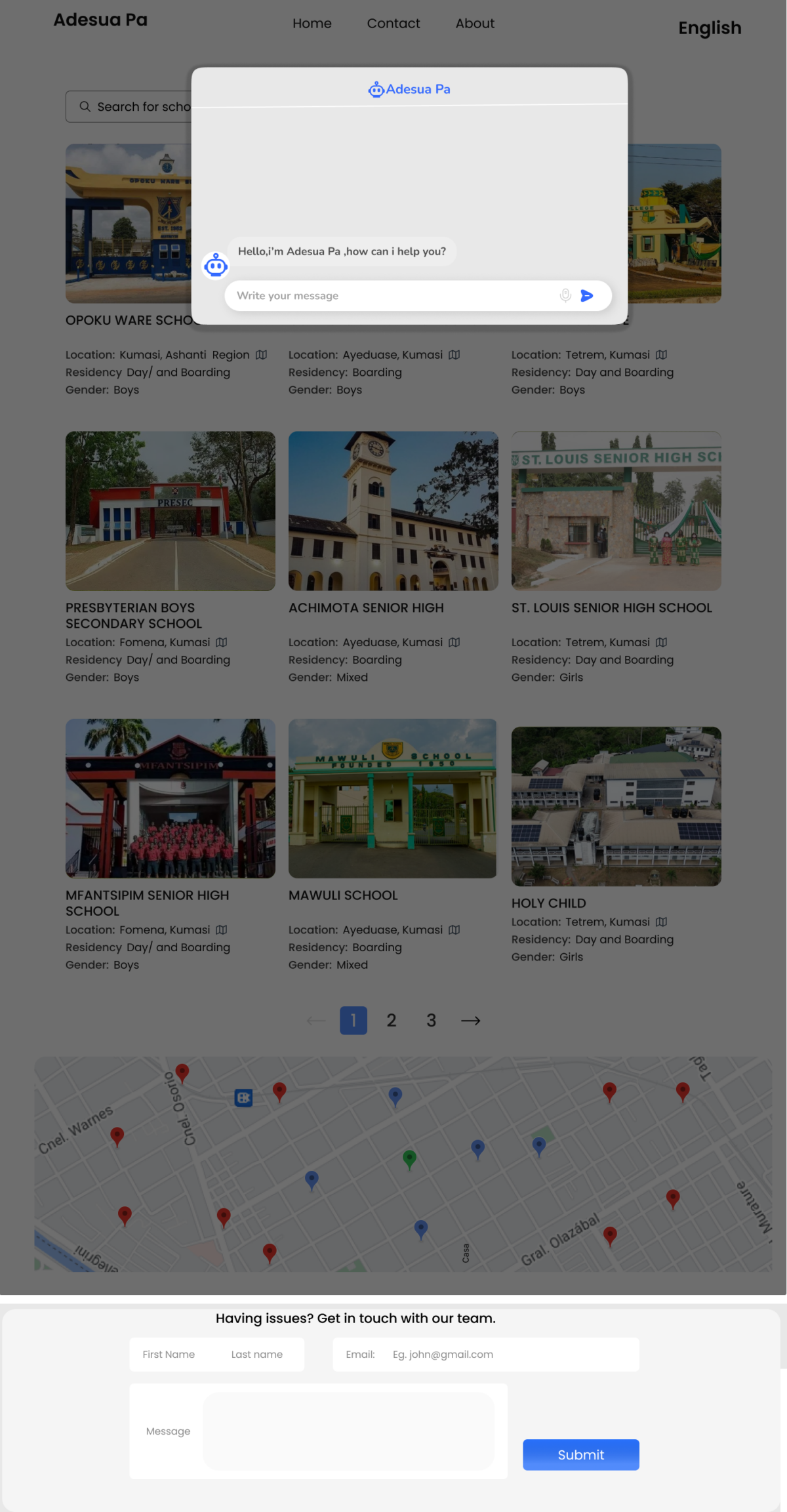
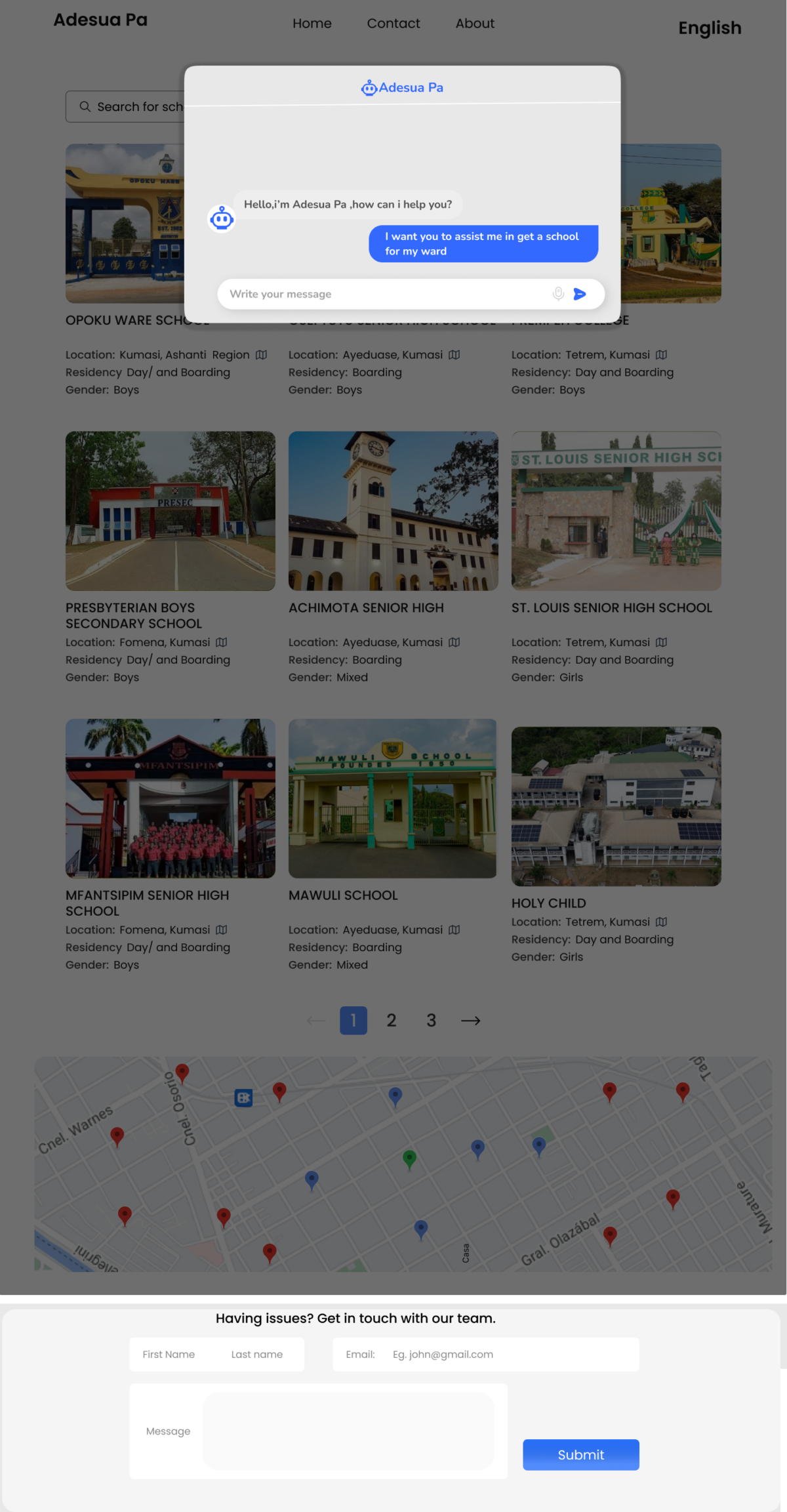
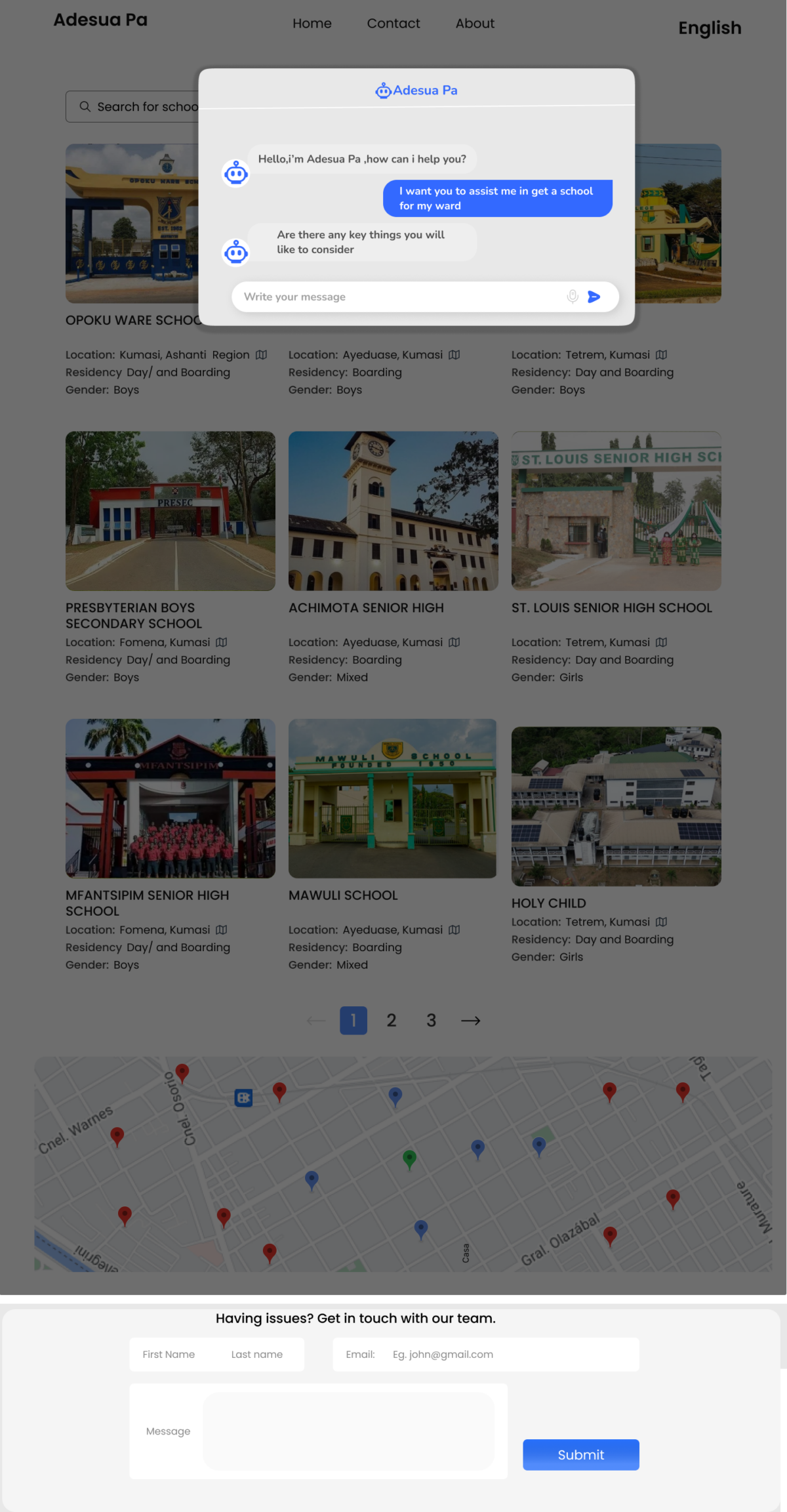
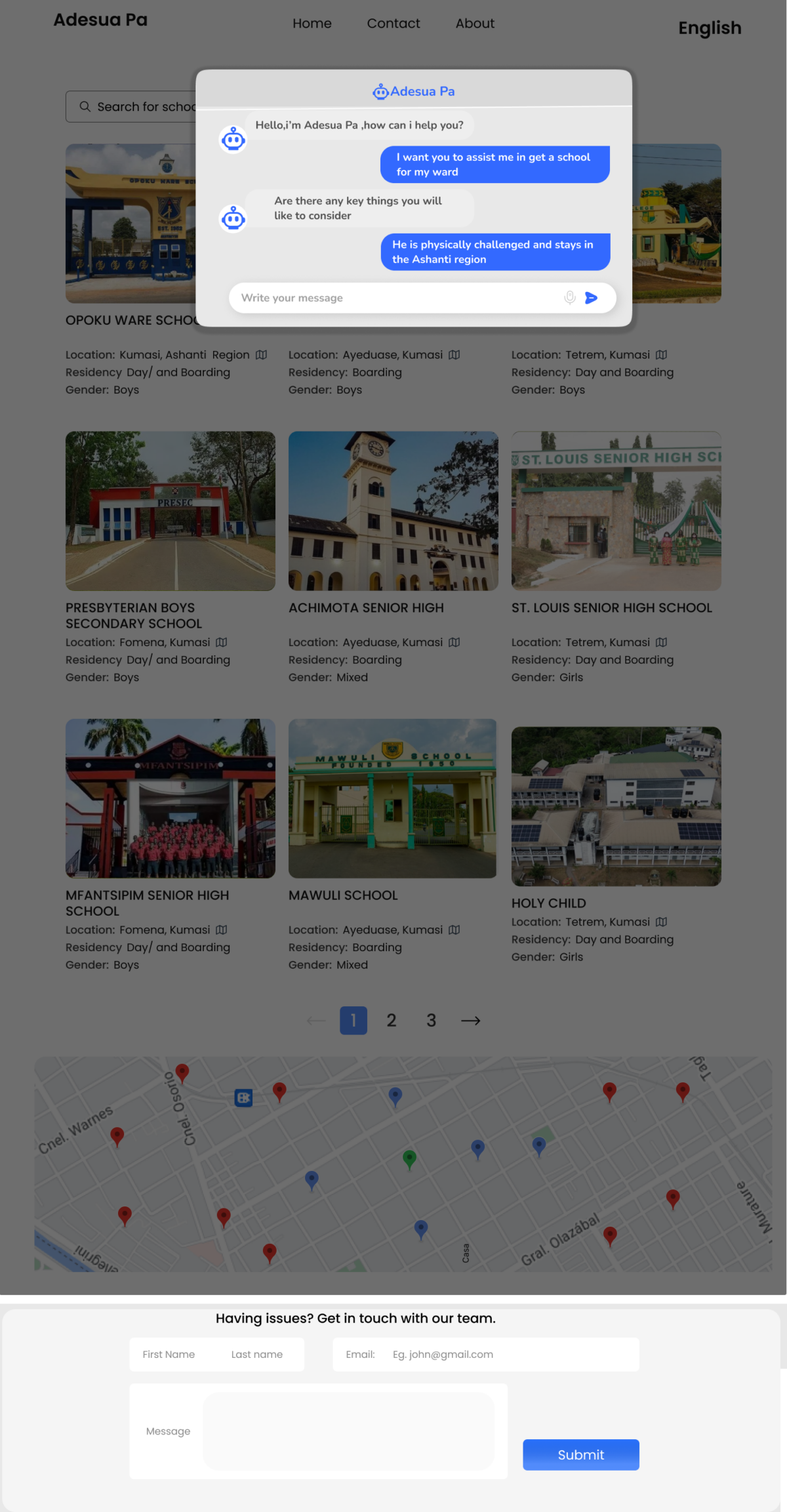
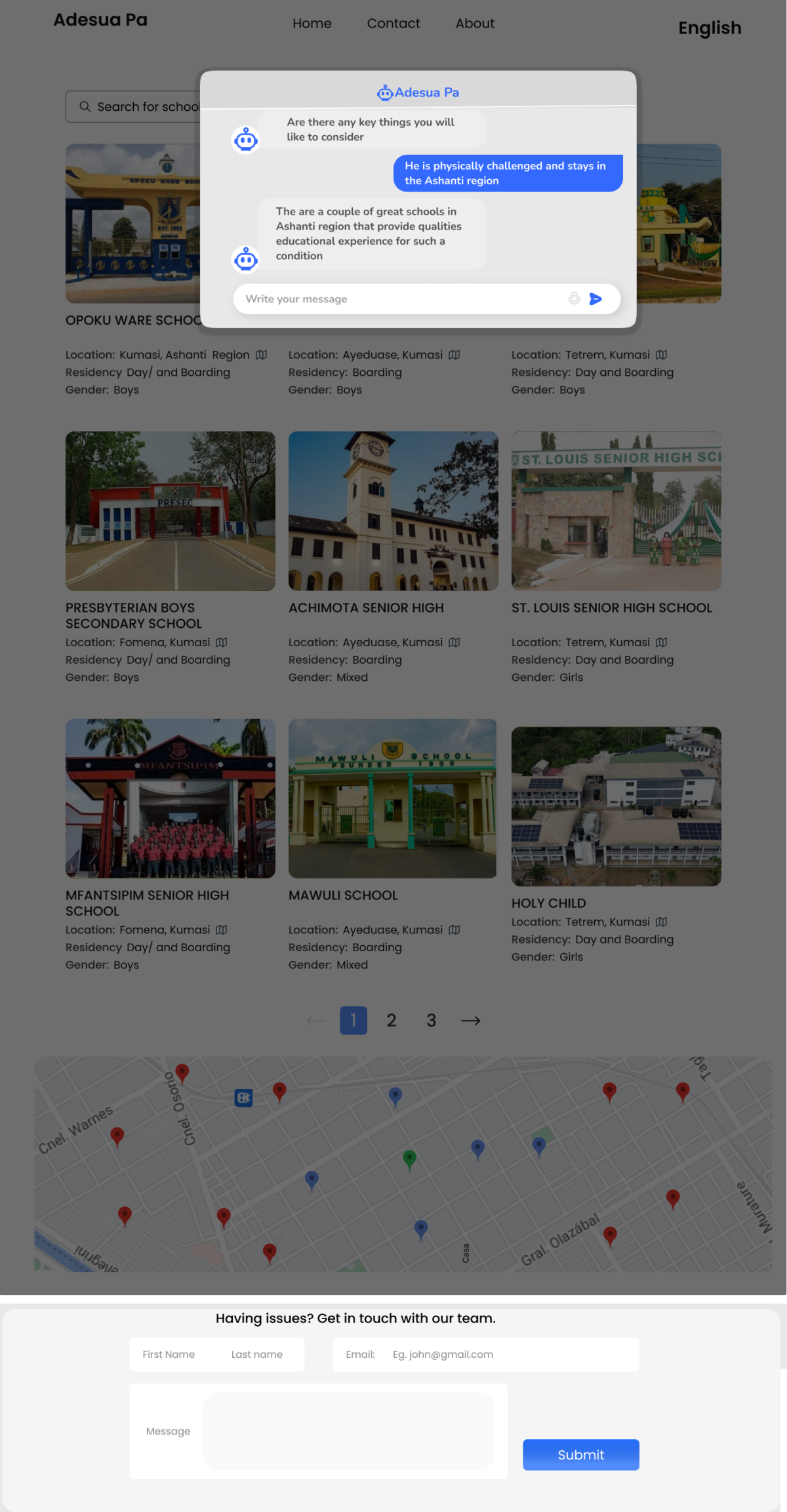
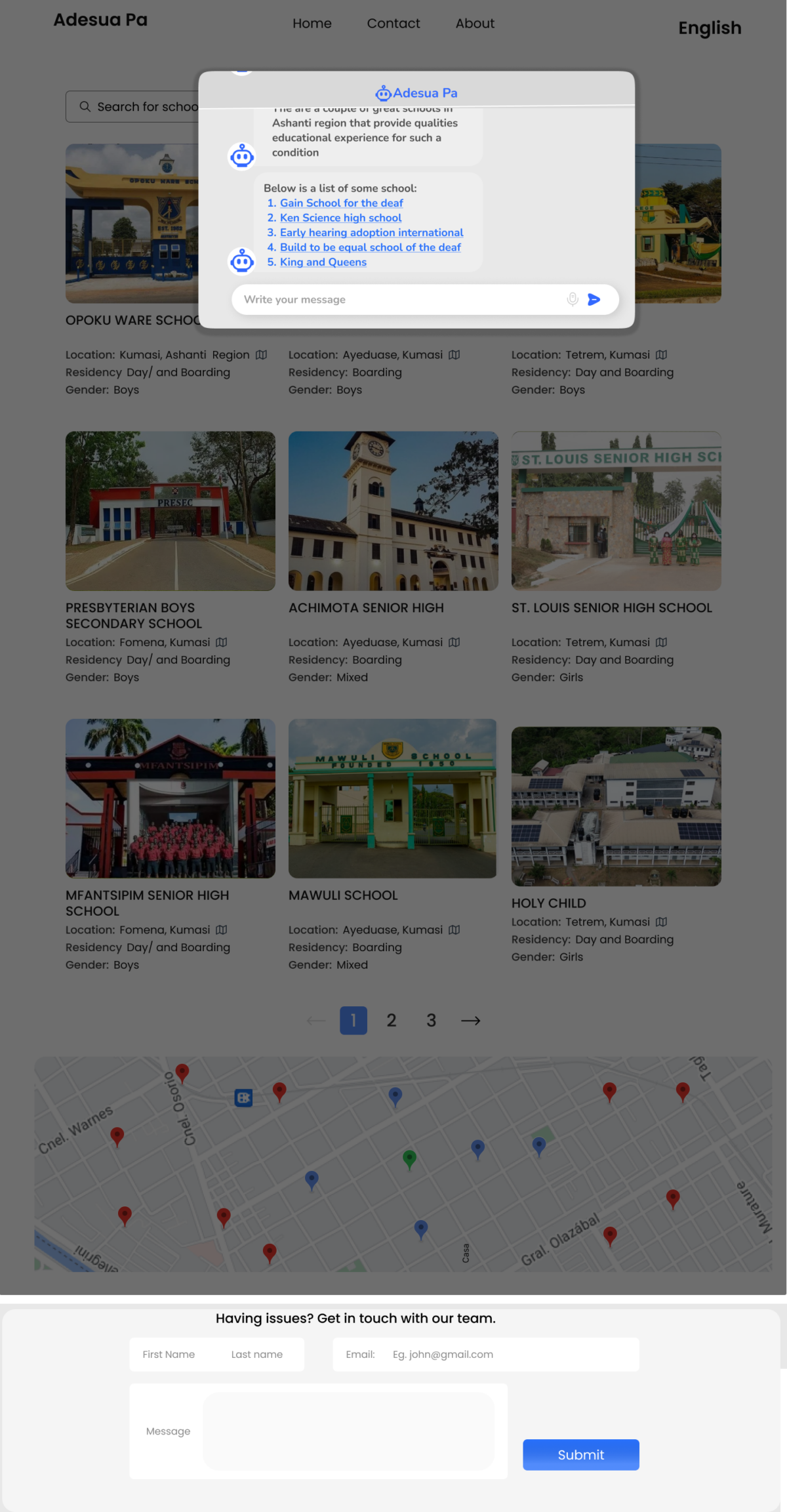
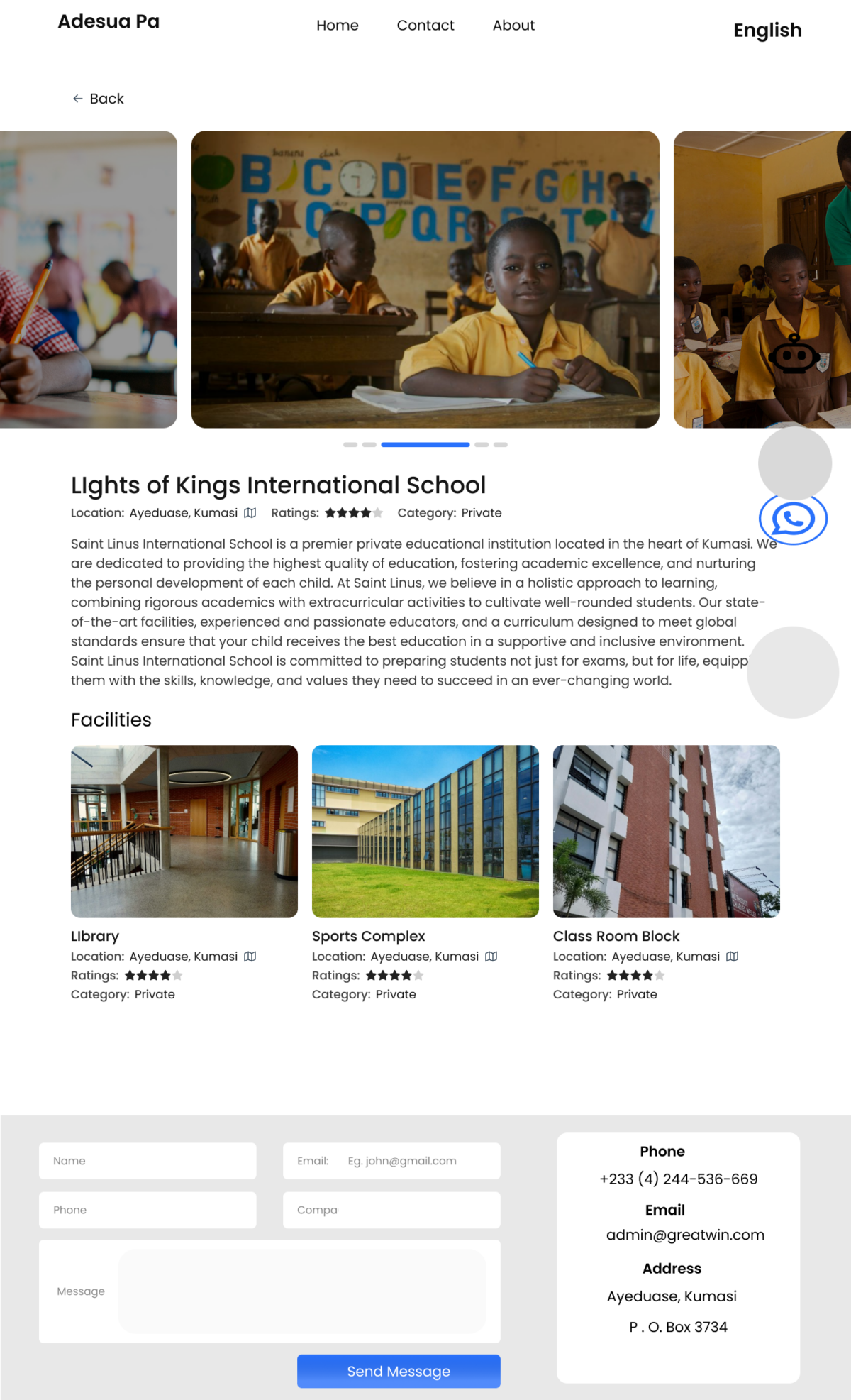
To take the issue of internet connectivity into account, we provide the Adesua Pa Query USSD: It provide us with on the go information with the need for internet connectivity.

This provide parents with the needed information at ago.
Our Goals
Empower families to make informed decisions about their children’s education, and promote inclusivity in schools.
Benefits
- Saves time and reduces stress for families
- Increases visibility for schools, especially those catering to students with disabilities
- Promotes a more inclusive educational landscape
CHALLENGING THE CHALLENGE
Scaling Up
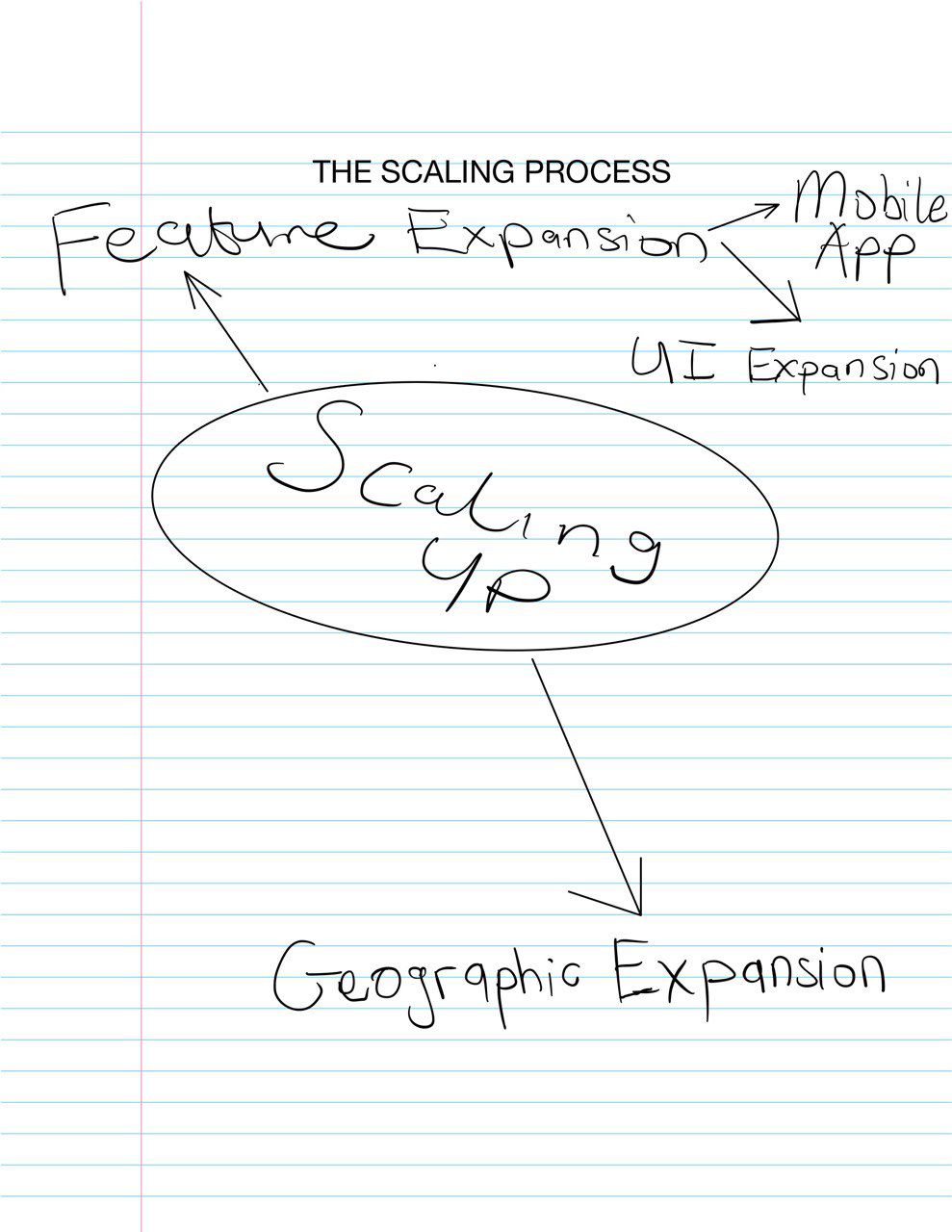
Expanding Geographic Reach
National Expansion – Extend the platform’s coverage to include more regions within Ghana, especially rural and underserved areas. Ensure that schools from every district are represented on the platform.
West African Regional Expansion – After achieving national success, expand the platform to neighboring West African countries like Nigeria, Côte d’Ivoire, and Togo, adapting the platform to meet local educational contexts.
Feature Expansion
Enhanced User Interface
we will continuously improve the website and USSD interface to handle more data and users, providing a seamless experience even as the platform scales.
Web App – We will develop a dedicated mobile app for the platform, allowing easier access for lovers of mobile apps.
Prediction Dashboard – This will predict schools future performances, dropout rate and career possibilities.
Scaling Deep

Enhanced User Interface – Continuously improve the website and USSD interface to handle more data and users, providing a seamless experience even as the platform scales.
Mobile App Development – Develop a dedicated mobile app for the platform, allowing easier access for users and facilitating offline access to data.
Feedback and Improvement
Reviews and ratings will provide schools with valuable feedback, enabling them to understand their strengths and areas for improvement.
Schools can use the platform to highlight their unique features and services, helping to differentiate themselves in a competitive educational landscape.
Scaling Wide

Diversifying Services
Vocational and Technical Schools – Expand the platform to include information on vocational and technical education institutions, broadening the scope of educational opportunities available to users.
Special Needs Education – Integrate data and resources for special needs education, ensuring the platform is inclusive for children with disabilities.
Cross-Sector Collaboration
Partnerships with Other Platforms – Collaborate with other educational platforms, health services, and social services to create a holistic ecosystem of support for families, broadening the platform’s utility.
Corporate Sponsorships – Engage with corporate sponsors to support the platform, offering incentives such as scholarships or technological support for participating schools.
PROJECT IMPACT
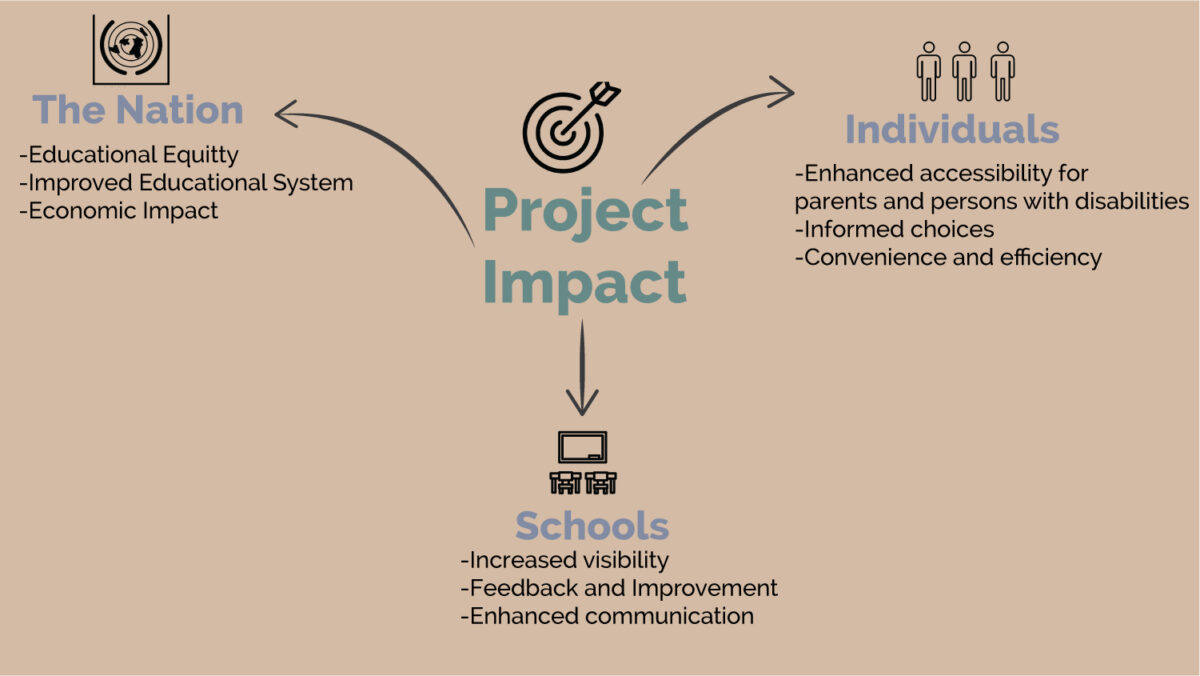
Impact on Individuals
- Easy access to school information helps parents and guardians make informed decisions.
- People with disabilities can find suitable schools that cater to their needs.
- Users can make informed choices based on detailed school profiles.
Impact on Schools
- Increased visibility and exposure to potential students.
- Feedback and improvement through reviews and ratings.
- Enhanced communication with the community.
Impact on the Country
- Promotes inclusivity and equal access to education.
- Helps level the playing field for families from different backgrounds.
- Provides valuable data for policymakers and educational planners.
- Encourages improvements in educational standards.
Economic Impact
- Streamlines the school selection process, saving time and resources.
- Supports specialized institutions that cater to people with disabilities.
- Contributes to national development goals related to education and social development.
Project Financials
Key Resources
Value Propositions
Customer Relationships
Channels
- Data
- Technology Infrastructure
- Skilled Team
- Branding and Marketing Materials
- Partnership Agreements
- Empowers Informed Decision-Making
- Promotes Educational Equity
- Leverages Advanced Technology
- User-Friendly Interface
- Supports Real-Time Updates.
- Comprehensive Resource for Stakeholders
- Parents interation
- Educational Institutions access
- Governmental Institutions access
- Community
Engagement - Friendly assistive
agent
- Website
- USSD
- Mobile App
- Social Media
- Community
Outreach
Revenue Streams
Key Activities
Customer Segments
Cost Structure
- Subscription Fees
- Advertising.
- Grants and Funding
- Corporate Sponsorships
- Data Services
- Data Collection and Analysis.
- Platform Development and Maintenance.
- User Support and Engagement.
- Marketing and Outreach.
- Partnership Management.
- Monitoring and
Evaluation
- Parents and Guardians
- Educational Institutions
- Governmental Institutions
- NGOs and Educational Advocacy Groups
- Tech Partners and Data
Providers
- Development and Maintenance
- Data Collection and Management
- Customer Support and Training
- Operational
Costs
Negative Externalities
Positive Externalities
- Digital Divide
- Privacy Concerns
- Overreliance on Data
- Educational Equity
- Informed Decision-Making
- Policy Impact
- Community Engagement
- Economic
Benefits
RoadMap
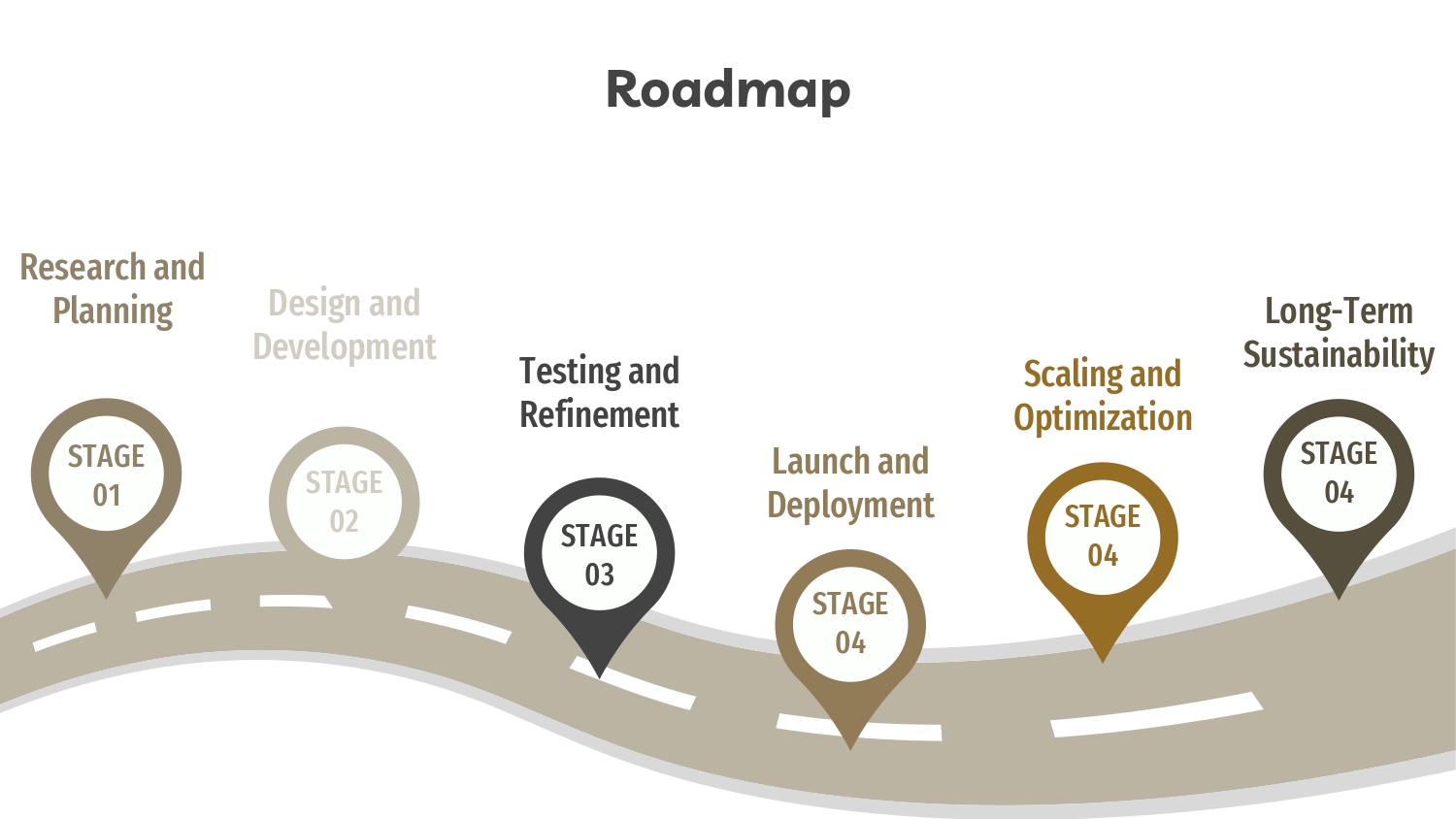
The Team




Margaret Baamah Patterson
Jeffrey Adu-Mante
_
Linus Tabari
_
Joshua Nsiah Addo Ofori
